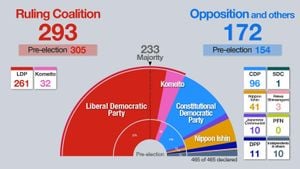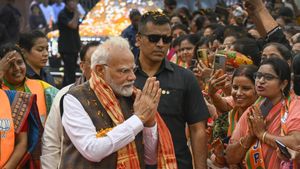Japanese Prime Minister Shigeru Ishiba is making headlines as he prepares for his inaugural summit with Chinese President Xi Jinping, scheduled for mid-November. An insider suggests the summit will occur on the sidelines of both the Asia-Pacific Economic Cooperation (APEC) forum summit and the Group of 20 leaders' meeting, with the most likely venue being Peru, where the APEC summit takes place from November 15 to 16. This meeting marks a significant step as Ishiba seeks to reestablish relations after recent tensions.
The backdrop for this summit is the recent thawing of relations between Japan and China, particularly following China's agreement to moderately lift its ban on Japan's seafood imports. The ban was imposed last year after treated radioactive water was released from the Fukushima Daiichi nuclear power plant, causing considerable contention. Ishiba is anticipated to vocalize Japan's concerns during the summit and will advocate for the resumption of seafood shipments, which is pivotal for many Japanese exporters hit hard by the ban.
While boosting trade is reportedly on the agenda, Ishiba is also expected to raise issues related to security, especially considering China’s increasing military maneuvers around Japan. Notably, August saw the first recorded breach of Japanese airspace by Chinese military aircraft, raising alarms and prompting closer inspections by Japanese defense forces. Ishiba's stance on this matter reflects rising tensions between the two nations, making the diplomatic summit even more necessary.
Earlier this month, President Xi extended his congratulations to Ishiba, expressing hopes for 'strategic and mutually beneficial' relations between the two nations. This is Xi's initial direct interaction with Ishiba since he assumed office. Their conversation showcases both leaders' willingness to navigate the delicate waters of international diplomacy.
Ishiba's meeting with Chinese Premier Li Qiang on October 10 marked his first diplomatic endeavor as Japan's leader, emphasizing Ishiba's push to strengthen ministerial dialogues and address pressing issues.
Despite previous challenges, Ishiba’s summit with Xi points toward Japan prioritizing its diplomatic relations with its giant neighbor to the west. Yet, it's also clear this summit is not just about trade; it's charged with the weight of geopolitical strategies and the need for security assurance.
With the political atmosphere shifting following recent domestic elections, support for Ishiba from his coalition partners could face challenges. The ruling coalition, primarily led by the Liberal Democratic Party (LDP), suffered significant losses, leading to inquiries about the future stability of Ishiba's leadership. Reflecting on these electoral outcomes, the coalition garnered only 215 seats—falling short of the 233 required for outright majority control—prompting immediate discussions about the government's longevity and Ishiba's capacity to unify his party.
This uncertainty has led to questions about how effectively Ishiba can assert Japan's interests during sensitive negotiations with China, especially as he confronts heavy opposition from within his coalition. The recent election results have revealed disconnects within the party, prompting some analysts to speculate on whether this could hinder his ability to forge productive conversations with Xi.
The upcoming summit symbolizes more than just diplomatic pleasantries; it's also Ishiba's chance to underline Japan's commitment to its national interests, even amid political turbulence. Advocates of both countries see this meeting as pivotal for addressing mutual concerns ranging from economic cooperation to security challenges posed by North Korea and broader regional stability.
Domestic sentiment surrounding this summit and Ishiba’s leadership will undoubtedly shape the dialogue's atmosphere. Analysts suggest careful observation will be required leading up to the meetings, not just for the outcomes of the negotiations, but also for the potential shifts they may bring to Japan's internal political dynamics.
With Ishiba's first summit with Xi around the corner, the stakes are undeniably high. The results of their discussions could have far-reaching impacts on not only Japan's diplomatic relationships but also its broader regional standing. Anticipation looms as both leaders prepare to tread the complex diplomatic terrain of cooperation, trade, and security.
Japan's recent electoral changes may present challenges for Ishiba during these talks, yet they also represent fertile ground for fresh discussions on cooperation. How effectively Japan's new Prime Minister can leverage this summit to benefit both nations will become apparent as the details emerge from the meetings next month, with all eyes trained on the outcomes.



